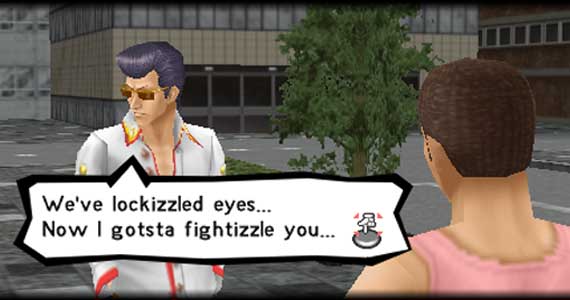
Kenka Bancho: Badass Rumble wears its intentions in the title, which works well since its sleeves are busy flapping in the wind from the force of the blows it works to put in the player’s face. Like a few other games this year, it aims to be the Bancho of power fantasy gaming, but unlike so many other contenders it also comes with a balance of humor, sub-culture, and pacing that gives it the upper-hand for an uppercut.
It’s a game I very much want to enjoy as much as the previous paragraph suggests I should. But against the enthusiasm of friends and other editors, there are fundamental flaws that make any long term affection difficult even while elements of the experience demand attention.
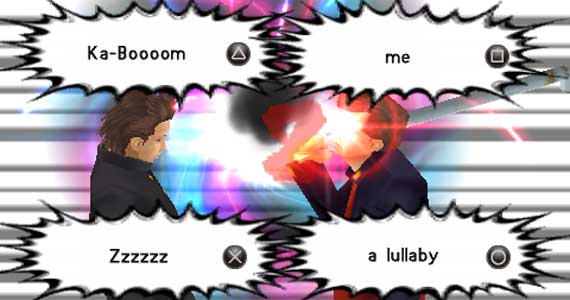
Kenka Bancho delivers a plot of quantum simplicity that is legitimately hard to resist. On a school field trip to Kyouto the player learns that there are many other schools also visiting, providing the opportunity to pick fights with the resident Bancho (badass) of every other school to be crowned the toughest of them all.
And with that players hit the streets of Kyouto, starting fights with lesser students to steal class itineraries and thereby locate the bigger fish. The focus is on attitude, allowing players to customize their appearance, clothing, and even fighting style as victories reveal new moves and status upgrades. If the game could be boiled down to a single moment, and it can, Kenka Bancho can be understood via the Menchi Beam, a laser beam that shoots from the player’s eyes to initiate fights with verbal intimidation.
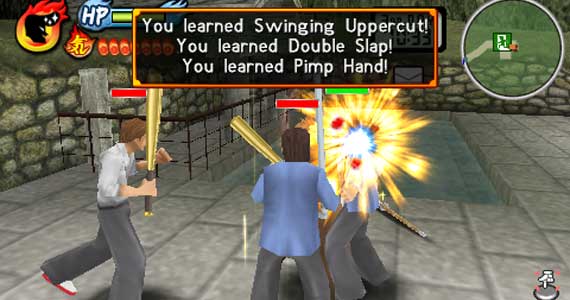
The problem is that Kenka Bancho’s toughest opponent is the camera, which makes landing punches and following through on combo attacks a difficult proposition, specifically when I have to run for an open space because a tree keeps obscuring the view while my health bar drops in the confusion.
I suppose it has to be taken in stride, given that a more refined title would veer into vanilla territory and lose the attitude of the plot and atmosphere.
The answer herein to the long-running problem of control is additional layers of features, such as the ability to upgrade your fighting moves and numerous characters and locations to interact with – as well as the ability to travel around the city via public transportation.
The ability to call defeated Banchos to serve as sidekicks to move through the main quest or even step out for a night on the town is certainly a nice touch, and yet the ability to do this is undercut by a fighting system that often causes me to injure those trying to help me. The game is forever chained to the flaw at the heart of it.
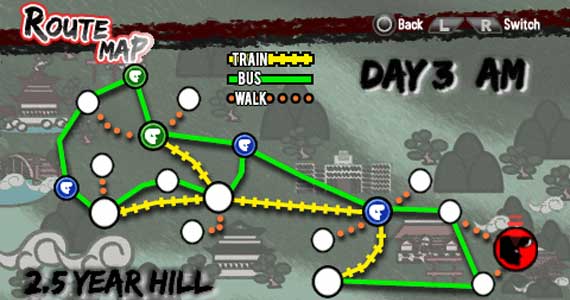
The feature that serves the game best is the time clock, which allots a set space for players to explore the city during the day, and more importantly places other Banchos in key areas during certain times. This not only helps the game feel less reliant on consistent combat, but also ensures a level of replay incentive – despite repeated playthroughs I still haven’t manage to fit everything into a single trip. These additional elements create a style that keeps me suffering through controls like few games have before, but it isn’t possessed of enough magic and charm to excuse them indefinitely.
The ability to upgrade fighting moves while progressing is the most promising feature on display, never realizing a fuller potential because of an inability to change the fact that players are still largely mashing buttons to execute moves. That those moves have often hilarious names doesn’t make them any less sluggish and sloppy to execute.
In the midst of dizzying players with the badass power fantasy, the game also shows a level of restraint increasingly lacking in other titles seeking to get players drunk on nearly unlimited abilities. Kenka Bancho keeps an ever-present sense of structure and balance that stops players from running completely amuck, driven home by the amount of times I was chased down and arrested by the police.
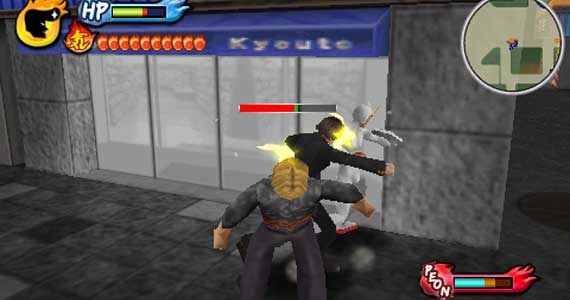
What’s clear is that Kenka Bancho is a game masking problems with a style that is intoxicating, but still unable to hide the fundamental repetition and core flaws that should be behind us. One could argue that the clumsy controls feed the punk attitude of the game, but I think we’ve heard this excuse more than enough from people trying to bail out other titles this cycle.
It isn’t one of those titles where Atlus’ localization talents serve as a crutch, though the company has been known to nearly turn a sow’s ear into silk in the past. While this is not another complete Atlus salvage operation, there’s an air of disappointment owing to the missed potential for a more complimentary relationship between the punches and the atmosphere.
In the end there’s a strange reversal of my favorite formula. Normally I’d be telling you why it’s worth pushing past poor window dressings to feast on a better dish buried underneath those trappings, but this is the opposite example. It’s awfully tempting to encourage the playthrough for those bits alone, but any long term relationship is hard to imagine – and I have a pretty active imagination.
Kenka Bancho: Badass Rumble
Developer – Spike
Publisher – Atlus
System – PlayStation Portable
Release Date – November 10, 2009
*A copy of this title was provided by the publisher for review
So basically, game deserves a rental and that’s pretty much it? Seems like a miss for Atlus but hey, they can’t all be winners, right?
Comment by EdEN — January 11, 2010 @ 1:52 pm
For sure, what I’ve always loved about Atlus is the titles I’d never get to see otherwise, the bulk of them offering something interesting even if it doesn’t quite pull together all the time. It isn’t hard to see why plenty would fight past issues to run through this game a few times, but the repetition with the fighting just kills it if you don’t enjoy the mechanics.
Comment by Jamie Love — January 11, 2010 @ 4:19 pm
Menchi Beams instantly sold me this game. I feel bad for not playing it yet though… mainly because I don’t want to update my firmware… doh! It’ll have to wait until I buy a cheap PSP-3000…
Comment by Ujn Hunter — January 11, 2010 @ 2:49 pm
umm dis game looks fresh but its either this or lunar:silver star harmony
Comment by big j — March 30, 2010 @ 6:53 pm
So you’ve made the smart choice and went with Kenka Bancho obviously? ;)
Comment by Ujn Hunter — March 31, 2010 @ 10:19 am